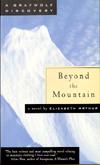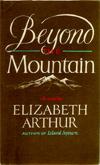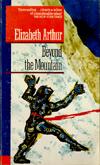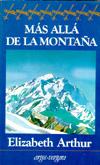 |
|
QUOTES FROM REVIEWS OF BEYOND THE MOUNTAIN
Published by Harper and Row, October 1983
|
|
Beyond the Mountain is a superb novel, elegantly written, gracefully developed, created with intelligence, good humor and deep insights into human nature. Elizabeth Arthur brings to the subject of mountaineering a mind that is supple, unprotected, uncommonly receptive, and wise. Her thoroughly imagined book has all the power of autobiography and all the suspense of a great adventure.
Ron Hansen, author of Mariette in Ecstasy
|
|
I have reads hundred of nonfiction and dozens of fiction books on the subject of mountaineering. Beyond the Mountain is the best written and most compelling novel relating to climbing I have ever read. Elizabeth Arthur is an extremely gifted novelist. Her story of the life of a complicated woman set against the background of a climb of one of the world's highest mountains is elegantly written and extremely moving. Arthur's sensitive portrayal of Nepal captures the essence of that wonderful and peculiar kingdom and true ambivalence of many Westerners toward it. Her images are vivid, her prose lyrical yet precise.
Arlene Blum, author of Annapurna: A Woman's Place
|
|
Arthur writes marvelously of the beauties and dangers of mountain climbing, but she is most skilled when it comes to illuminating the indelible traceries of the inner life of her central character. Bit by bit she reveals the interweaving of heart and spirit, the intricate connections with others, the struggle for survival of self.
Publisher's Weekly, August 12, 1983
|
|
The story of the climb and of the avalanche... is as stunning, stark and subtle as the blue and white landscape that enchants these people. Arthur...chooses words as carefully as her narrator chooses where to place her foot or to hammer a piton. She makes her reader think afresh about tired words like 'happiness' and 'guilt', and she makes a foreign world -- of Sherpas in Gore-Tex parkas and of belays below aretes -- seem the only one that matters.
The New Yorker, January 16, 1984
|
|
The writing is reminiscent of the gritty precision of her earlier book, Island Sojourn. She writes with the tactile grace of someone who has both registered and contemplated experience. From Wyoming to Nepal, the book repeatedly strikes us with its sense of observed life. The marvelous descriptions come through the central figure, Temis Phillips, a tough, self-questioning and often very funny protagonist ...The novel's many virtues (include) its seriousness, memorable heroine and its striking imagery. Climbing fiction this good is a rarity.
Steven Jervis, American Alpine Journal, Winter 1994
|
|
The climax of an effort by an American women's expedition to climb a Nepalese mountain is the subject of this vivid, exhilarating novel which should bring its author the recognition she didn't get when her Island Sojourn came out.
Clarissa K. Wittenberg, The Washington Times Daily, November 8, 1983
|
|
In her first novel, Beyond the Mountain, Elizabeth Arthur relates a gripping tale of the unharnassable power and terrible beauty of both nature and human desire...exhilarating and lyrical descriptions of the mystical illusions and biting realities of a mountain climber's life. In addition to the exterior images which the author brings to life, the book contains some startling insights into the inner machinations of the main character's mind and heart.
Sheila Gilbride, Best Sellers, December 1983
|
|
Believability within the context of the extraordinary is a remarkable feature of Arthur's book. The high degree of emotional truth in addition to the foreign, graphic world of mountaineering makes it uniquely memorable... Beyond the Mountain is, for all its brevity, a densely woven, ambitious book. Its concerns and characters, its lyricism and sculpted form will speak to and impress the sensitive reader.
Gardner McFall, Washington Post Book World
|
|
A novel with much insight into human nature, and much wisdom...By choosing a journey as the setting for a spiritual quest, Elizabeth Arthur echoes an old tradition...And, as Arthur superbly demonstrates, the theme has lost none of its freshness or urgency.
Gabriele Grozinger, Christian Science Monitor, October 19, 1893
|
|
(The) author's observations and exposition...is as clear and exhilarating as mountain air. Marcia Fuchs, Library Journal, August 1983 Her style is compelling and her prose lyrical. This is not only a story of complex relationships, it is suspenseful and adventurous to the end.
B.Dalton Booksellers, November 4, 1983
|
|
When writing about nature, Arthur is outstanding. Her eye for detail and her passion for landscape bring us closer to understanding the desires that compel both men and women to climb mountains. There are moments with the stark intensity of a dream.
Alice Hoffman, The New York Sunday Times Book Review, November 20, 1983
|
|
Arthur has written a fine first novel which should find an audience among mountain-climbing buffs and armchair adventurers...Arthur is tremendously successful in depicting both the landscapes of Wyoming and Nepal and in creating tension in the unraveling of her two tales. Artemis, through the most dramatic of circumstances, learns to survive, and it is this ability that remains most vividly when the novel is finished.
Barbara Tritel, San Francisco Examiner-Chronicle, January 1, 1994
|
|
The most impressive thing about Elizabeth Arthur's novel Beyond the Mountain is the crisp control of its images...Thanks for Arthur's skill the odyssey is seductive. The passages drawn from Artemis' memory are as sharp as those recounting the pursuit of the summit...A host of small things well-told that plots our way through rugged psychological terrain.
Susan Pelzer, Pacific Northwest Journal, December 1983
|
|
A gripping novel about an all-women's mountain-climbing expedition in Nepal...Arthur explores the psyche of Artemis Phillips, a landscape as vast, lonely, and spectacular as the Himalayas. Her musings and memories, insights and turns of mind ring so true and poignant, it's a privilege to wander there with her, as she climbs in the mountains of her dreams.
Pat Hickey, New Age Journal, January 1984
|
|
Written with superb control... Arthur's prose has some of the elements of the mountain pursued by her heroine. There is starkness and majesty, but beneath the surface lies the hidden crevasses, the relentless convolutions of the subconscious.
Colleen Kelly Warren, St.Louis Post-Dispatch, November 13, 1983
|
|
 UP TO TOP UP TO TOP |
|
| |
|
Elizabeth Arthur’s first book, Island Sojourn, won her acclaim for its extraordinary subtlety and depth. Beyond the Mountain, her first work of fiction, will mark another kind of beginning - the arrival of an important novelist whose new book is as vivid as her last, but even more finely hewn in its subtlety and violence. Original and unforgettable images mark this novel about guilt, desire, and passion. Its beautifully crafted observations reveal, in Joseph Conrad’s words, “a single-minded attempt to render the highest kind of justice to the visible universe.”
Why climb a mountain? Because it’s there. Sir George Leigh Mallory’s famous explanation has haunted the imagination since its utterance, yet for those who have never climbed, its meaning remains as inscrutable, as tantalizing, as enigmatic as the jutting snow-shrouded palisades of the mountain at the heart of this novel. On that mountain’s slopes is set the story of a climber and her ascent to escape from her past.
Artemis Phillips has been a climber for most of her life. With her brother Orion and her husband Nicholas Rhodes she has traveled to some of the world’s great ranges and achieved fame as an accomplished mountaineer. When she joins a women’s expedition in Nepal, she is only dimly aware of the forces which push her up the slopes, but it becomes clear that she desires atonement. For Temis, the ascent becomes a series of confrontations - with those strangers who make Nepal their home, with the challenge of snow and ice, with memory and desire. The simplicity of the mountain symbolizes everything Temis wants to be - and her odyssey is largely a journey into the past and into her electric, obsessive, passionate marriage to Nicholas, a marriage that has almost destroyed her.
Elizabeth Arthur proves again that she is a writer of formidable talent. Beyond the Mountain shows us people in extremis and illuminates the complexities of our lives. In the end, the novel is an affirmation - of independence and the fellowship of man.
|
 UP TO TOP UP TO TOP |
|







